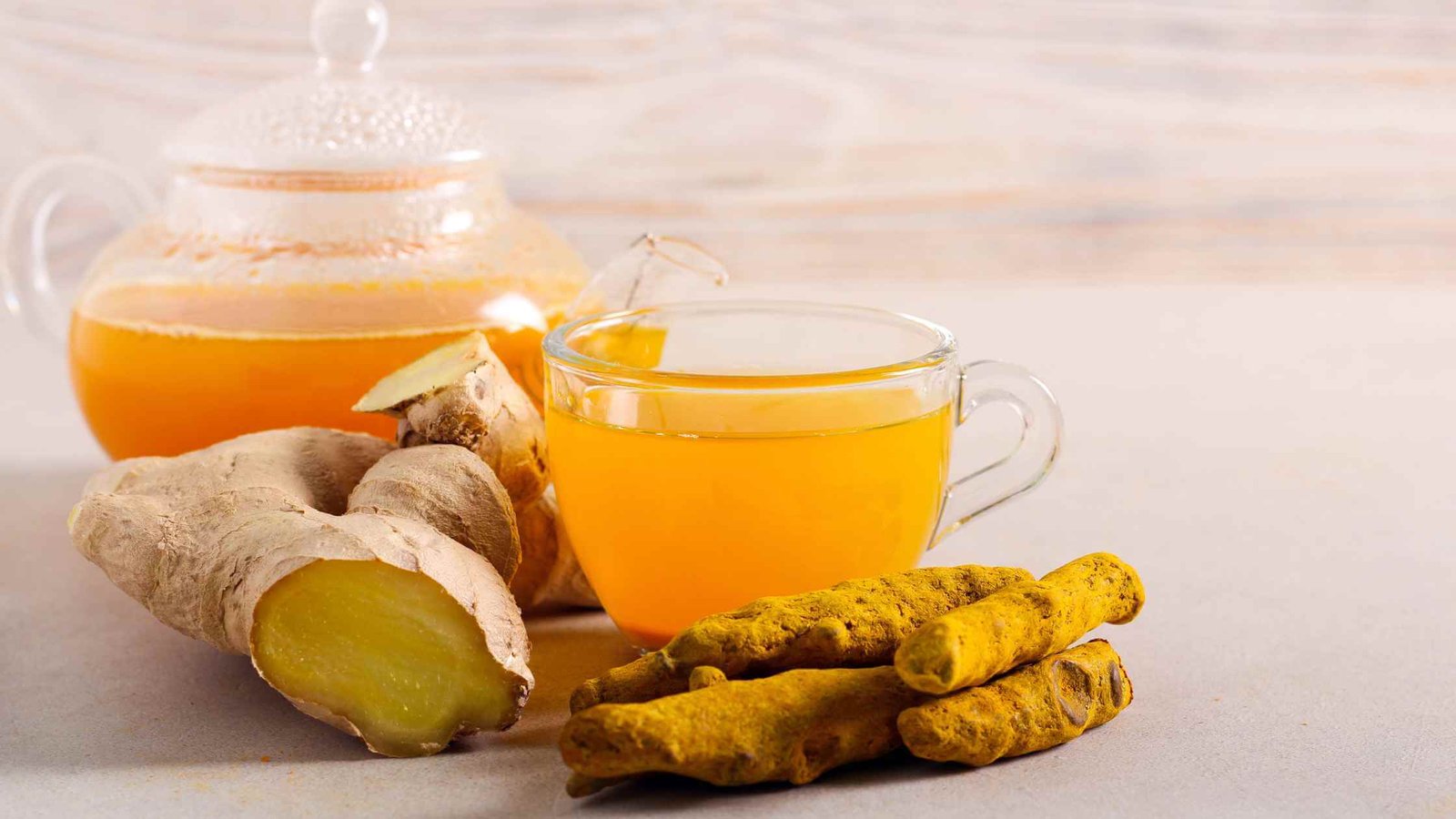Ginger Tea Benefits Unveiled: 13 Remarkable Ways It Boosts Your Health

Ginger tea, derived from the ginger plant, has been enjoyed as a warm and invigorating beverage for thousands of years. Apart from its delightful taste, this aromatic tea offers a wide range of health benefits.
From alleviating nausea to soothing menstrual cramps, ginger tea possesses anti-inflammatory and antioxidant properties that can promote overall well-being. Moreover, preparing this beverage is a breeze, requiring only fresh ginger and boiling water.
In this article, we will delve into the wonders of ginger and ginger tea, exploring the potential health advantages they provide.
What Is Ginger?
Native to parts of Asia, such as India, China, and Japan, ginger is a plant with a long history of culinary and medicinal use. The rhizome, an underground stem with a knotted and bulbous appearance, is the part of the plant traditionally employed for its flavors and health benefits. Its thin beige skin surrounds the rhizome, while the above-ground portion boasts long, narrow green leaves and white or yellowish-green flowers. In Asia, ginger has been revered as a medicinal herb for over 2,500 years and as a spice for at least 4,400 years.
What Is Ginger Tea?
Ginger tea, despite its name, does not actually contain tea leaves. Instead, it is a concoction or infusion made from the rhizome of the ginger plant. According to Kantha Shelke, Ph.D., a certified food scientist, ginger tea is prepared by steeping fresh ginger in boiling water for at least 10 minutes to extract its beneficial properties.
Another method involves stirring a spoonful of ginger preserves into hot water. Both techniques yield a flavorful and aromatic beverage that can be enjoyed at any time of the day.
It is worth noting that moderation is advised when consuming ginger tea, and individuals taking blood thinners or blood pressure medications, as well as those with bleeding disorders, should exercise caution. Consultation with a healthcare professional is recommended for individuals with gallstones, diabetes, or those who are pregnant or breastfeeding.

SkinnyFit Detox Tea
- Slim down, soothe bloating, and boost your energy naturally!
- SkinnyFit Detox is a detox product that does not contain laxatives.
- Made with 13 metabolism-boosting superfoods.
- Each package includes 28 servings.
benefits of ginger tea
Ginger has been esteemed for its potential health benefits for centuries, and recent studies have begun to shed light on its advantages. While some research is still preliminary and further investigation is required, the available data supports several potential advantages.
It is important to note that the potency of ginger tea, its consumption alongside other substances, the form of ginger used, and the frequency of consumption can influence the benefits derived. Now, let’s explore the various health benefits that ginger tea can offer.
1. Source of Vitamins and Minerals
Regular consumption of ginger tea provides a convenient way to incorporate essential vitamins and minerals into your diet. Ginger contains a variety of nutrients, including vitamin C, vitamin B6, magnesium, potassium, copper, manganese, fiber, and water, as stated by Monique Richard, an integrative functional dietitian[^3].
These vitamins and minerals play vital roles in the body’s development and normal function. For instance, vitamin C aids in iron absorption, tissue health maintenance, and wound healing, while vitamin B6 contributes to red blood cell formation and brain function. Magnesium is involved in over 300 biochemical reactions, including nerve and muscle function.
2. Anti-inflammatory Properties
Ginger’s anti-inflammatory effects are widely recognized and celebrated by experts such as Richard and Shelke. Scientific studies have demonstrated that ginger’s active components can effectively reduce inflammation by suppressing pro-inflammatory cytokines and down-regulating the induction of inflammatory genes.
Individuals suffering from osteoarthritis, the most common form of arthritis characterized by joint cartilage breakdown or damage, have reported pain relief after consuming ginger[^4].
3. Treatment for Nausea and Vomiting
Throughout history, ginger has been employed as a natural remedy for alleviating nausea and vomiting. Current scientific evidence supports its efficacy, particularly in managing these symptoms during pregnancy.
Additionally, a study revealed that ginger outperformed a drug in reducing nausea and vomiting caused by general anesthesia. Nevertheless, it is important to consult with a healthcare provider to determine the most suitable treatment.
4. Digestive Aid
Ginger has long been recognized for its positive effects on gastrointestinal motility, influencing the speed at which food moves through the digestive system. Studies have shown that ginger can improve digestion and dysrhythmia, a condition that disrupts the movement of food within the digestive tract.
However, it is worth mentioning that some individuals may experience mild gastrointestinal effects, such as bloating or general discomfort, when consuming ginger.
5. Alleviation of Menstrual Cramps
Ginger tea may offer relief from dysmenorrhea, which refers to the pain experienced during menstruation. According to Richard, evidence from six different trials suggests that ginger is comparable to nonsteroidal anti-inflammatory drugs (NSAIDs) like aspirin or ibuprofen in treating menstrual pain, though further research is required.
6. Potential Metabolic Benefits
Ginger’s thermogenic properties have made it a popular ingredient in weight management-related products. Shelke explains that ginger’s “warming effect” can stimulate the metabolic rate, thereby aiding in calorie burning and appetite control.
Moreover, ginger has been found to inhibit intestinal fat absorption and promote thermogenesis, potentially contributing to the management of obesity.
Ginger has also shown promise in reducing cholesterol levels and preventing blood clotting, thus assisting in the prevention of heart disease. Additionally, ginger may have a positive impact on blood sugar levels in individuals with type 2 diabetes.
7. Protection of Brain Health
Oxidative stress, caused by an imbalance between antioxidants and free radicals, can lead to cellular and tissue damage, contributing to degenerative diseases such as Alzheimer’s and Parkinson’s. Ginger’s anti-inflammatory and antioxidant properties have been found to reduce oxidative stress and inflammation markers, potentially protecting brain health.
8. Potential Immune-Boosting Effects
Ginger contains potent antioxidants that can help strengthen the immune system. The antioxidants found in ginger, such as gingerol, have been shown to have antimicrobial and antiviral properties, which may help protect against infections and support overall immune function.
9. Relief from Respiratory Issues
Ginger tea is often used as a natural remedy for respiratory problems, including coughs, colds, and congestion. Its warming properties can help soothe the throat and alleviate congestion, while its antiviral and antibacterial properties may assist in fighting respiratory infections.
10. Aid for Motion Sickness
Ginger has long been used to relieve symptoms of motion sickness, such as nausea and dizziness. Ginger tea can be a natural and effective way to combat these discomforts during travel. It is believed that ginger helps regulate the digestive system and reduces the sensitivity of the inner ear, which is responsible for maintaining balance[^3].
11. Potential Cancer-Fighting Properties
Emerging research suggests that ginger may possess anti-cancer properties. Some studies have indicated that the active compounds in ginger can inhibit the growth and spread of certain types of cancer cells, including ovarian, pancreatic, and colorectal cancer. While further research is needed to establish its effectiveness as a standalone treatment, ginger’s potential as a complementary therapy is promising.
12. Skin and Hair Benefits
Ginger tea can also offer benefits for the skin and hair. The antioxidants in ginger can help protect against free radicals that contribute to aging and damage to the skin and hair follicles. Some individuals also report that ginger tea can promote hair growth and improve scalp conditions like dandruff.
13. Important Considerations and Precautions
While ginger tea is generally considered safe for most people when consumed in moderation, it’s essential to be aware of potential interactions and precautions.
Ginger can interact with certain medications, including anticoagulants, blood pressure medications, and diabetes medications, so it’s crucial to consult with a healthcare professional if you have any concerns or pre-existing conditions[^8]. Additionally, individuals with gallstones may need to avoid ginger as it can stimulate the gallbladder[^9].
Conclusion
With its multitude of health benefits and delicious taste, ginger tea is a fantastic addition to any diet. Whether you sip it for its vitamins, minerals, anti-inflammatory properties, or to find relief from nausea or menstrual cramps, ginger tea offers a range of advantages.
Moreover, brewing this invigorating beverage at home is simple and affordable. So why not indulge in a cup of ginger tea and let its warmth and zest enhance your well-being?
Sources:
- India.com: “Ginger: The Wonder Spice With Healing Powers You Didn’t Know About”
- The Spruce Eats: “Ginger History and Uses”
- Healthline: “The 12 Best Benefits of Ginger Tea”
- Arthritis Foundation: “Ginger for Arthritis Pain: Does It Really Work?”
- Healthline: “10 Benefits of Ginger Tea”
- Healthline: “Ginger for Menstrual Cramps”
- Healthline: “Ginger and Weight Loss: An In-Depth Look”
- Healthline: “9 Health Benefits of Ginger Tea”
- Healthline: “Ginger for Brain Health: 6 Benefits and Uses”






